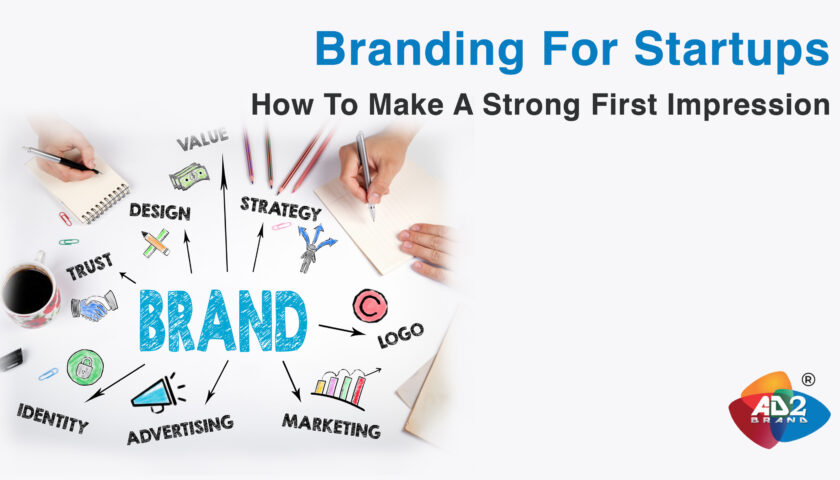Starting a new business venture is an exciting and challenging journey, especially for startups. As you step into the competitive market, one crucial aspect that can determine your success is branding. Building a strong brand identity from the outset is essential to make a lasting impression on potential customers and gain their trust. This article will guide you through the process of branding for startups, focusing on how to make a strong first impression that sets the tone for your business.
The Importance of Branding for Startups
Branding is more than just a logo or a catchy tagline. It encompasses your company\’s values, mission, and personality. For startups, effective branding can make a significant difference in how they are perceived in the market. Here are the key reasons why branding is essential for startups:
1. Creating Recognition: Strong branding helps your startup stand out in a crowded market. A well-designed logo and consistent brand elements make your business easily recognizable.
2. Building Trust: A cohesive brand image instills confidence in potential customers. When your brand messaging is clear and consistent, it fosters trust and reliability.
3. Fostering Loyalty: Customers are more likely to stay loyal to a brand they connect with on a personal level. Branding helps in building an emotional connection with your audience.
4. Setting Expectations: A strong brand sets expectations for your products or services. It communicates what customers can expect from your offerings.
5. Competitive Edge: In a competitive landscape, branding can be a differentiator. A compelling brand story can sway customers to choose your startup over competitors.
6. Attracting Investors: Investors are attracted to startups with a strong brand strategy. A well-established brand signals professionalism and a long-term vision.
H2: Understanding Your Target Audience
Before you embark on the branding journey, it\’s crucial to understand your target audience thoroughly. Identifying your ideal customer persona will help you tailor your brand message to resonate with the right people. Here\’s how to understand your target audience better:
1. Conduct Market Research: Use surveys, interviews, and analytics to gather data on your potential customers\’ preferences, pain points, and behaviors.
2. Create Buyer Personas: Develop detailed buyer personas representing your ideal customers. This includes demographic information, interests, and challenges.
3. Analyze Competitors: Study your competitors\’ branding strategies and identify gaps in the market that your startup can fill.
4. Identify Unique Selling Proposition (USP): Determine what sets your startup apart from others and highlight this USP in your branding efforts.
Crafting Your Brand Identity
Once you have a solid understanding of your target audience, it\’s time to create your brand identity. Your brand identity is the visual representation of your startup\’s values and personality. Here are the key steps to craft a compelling brand identity:
1. Design Your Logo: Your logo is the face of your brand. Invest in professional logo design that reflects your startup\’s identity.
2. Choose a Color Palette: Colors evoke emotions and play a crucial role in brand perception. Select a color palette that aligns with your brand personality.
3. Create Brand Guidelines: Develop a set of brand guidelines that outline how your brand elements should be used across various platforms.
4. Craft a Brand Story: Your brand story should narrate your startup\’s journey, mission, and values. Make it relatable and authentic.
5. Design Marketing Collateral: Ensure consistency across marketing materials like business cards, brochures, and social media graphics.
Establishing Brand Voice and Messaging
Your brand voice and messaging define the tone and language you use to communicate with your audience. Consistency in messaging is crucial for building brand recognition and trust. Here\’s how to establish your brand voice:
1. Understand Your Tone: Determine whether your brand voice is casual, professional, humorous, or authoritative, depending on your target audience.
2. Create Brand Messaging: Develop key messages that convey your brand\’s values, benefits, and USP clearly and concisely.
3. Use Storytelling: Incorporate storytelling into your marketing to engage and connect emotionally with your audience.
4. Consistent Communication: Ensure that all your brand communications, including website copy, social media posts, and customer interactions, adhere to your brand voice.
Building an Online Presence
In today\’s digital age, having a strong online presence is vital for startups. An online presence expands your reach and allows you to connect with potential customers worldwide. Here\’s how to build an impactful online presence:
1. Create a Website: Build a user-friendly and visually appealing website that showcases your brand and offerings.
2. Optimize for SEO: Incorporate relevant keywords and LSI keywords into your website content to improve search engine visibility.
3. Leverage Social Media: Identify the platforms where your target audience is most active and create a social media strategy to engage with them.
4. Start Blogging: Maintain a blog on your website to share valuable content, industry insights, and updates about your startup.
5. Invest in Email Marketing: Build an email list and use email marketing to nurture leads and keep customers informed about your brand.
Utilizing Content Marketing for Branding
Content marketing is a powerful tool for startups to establish thought leadership, build brand authority, and engage with their audience. Here\’s how to leverage content marketing for branding:
1. Create Valuable Content: Develop high-quality content that addresses your audience\’s pain points and provides actionable solutions.
2. Guest Blogging: Contribute guest posts to authoritative websites in your industry to reach a broader audience.
3. Infographics and Visual Content: Use infographics, videos, and other visual content to make your brand messages more engaging.
4. Podcasting: Start a podcast to share industry insights and interviews, positioning your startup as an expert in the field.
5. Host Webinars: Organize webinars to educate your audience about industry trends and demonstrate your expertise.
Leveraging Influencer Marketing
Influencer marketing has become a powerful tool to amplify brand reach and credibility. Partnering with influencers can help your startup gain visibility among their followers. Here\’s how to leverage influencer marketing effectively:
1. Identify Relevant Influencers: Look for influencers who align with your brand values and have an engaged audience within your target demographic.
2. Build Authentic Relationships: Instead of one-off partnerships, focus on building authentic and long-term relationships with influencers.
3. Sponsored Content: Collaborate with influencers on sponsored content that showcases your startup\’s products or services.
4. Influencer Takeovers: Allow influencers to take over your social media for a day to introduce your brand to their followers.
The Power of Customer Testimonials
Customer testimonials are a valuable form of social proof that can strengthen your brand\’s reputation. Positive reviews and feedback from satisfied customers build trust and confidence in potential buyers. Here\’s how to leverage customer testimonials:
1. Collect and Showcase Testimonials: Request feedback from satisfied customers and showcase their testimonials on your website and social media.
2. Video Testimonials: Video testimonials add a personal touch and are more compelling than written ones.
3. Case Studies: Create detailed case studies that highlight how your startup has solved specific problems for customers.
Engaging in Community Outreach
Community outreach is an excellent way to establish your startup as a socially responsible and caring brand. Engaging in community initiatives shows that your brand is invested in making a positive impact beyond profits. Here\’s how to engage in community outreach:
1. Support Local Events: Sponsor or participate in local events that align with your brand values.
2. Volunteer Efforts: Encourage your team members to participate in volunteer activities, showcasing your brand\’s commitment to giving back.
3. Cause-Related Marketing: Collaborate with nonprofits or charitable organizations and donate a percentage of your sales to support a cause.
Handling Brand Reputation
Your startup\’s brand reputation is delicate and can be influenced by various factors, including customer feedback, online reviews, and social media interactions. Here\’s how to handle your brand\’s reputation effectively:
1. Monitor Online Presence: Regularly monitor mentions of your brand on social media, review websites, and other online platforms.
2. Respond to Feedback: Address both positive and negative feedback promptly and professionally.
3. Apologize and Make Amends: If your startup faces a PR crisis, take responsibility, apologize, and take appropriate actions to rectify the situation.
4. Encourage Positive Reviews: Encourage satisfied customers to leave positive reviews on review websites.
Measuring Brand Success
Measuring the success of your branding efforts is essential to understand what strategies are working and what needs improvement. Here are the key metrics to gauge brand success:
1. Brand Awareness: Track brand mentions, social media reach, and website traffic to assess your brand\’s visibility.
2. Customer Perception: Conduct surveys or analyze customer feedback to understand how your brand is perceived.
3. Lead Generation: Measure the number of leads generated through your branding initiatives.
4. Conversion Rates: Analyze the conversion rates of leads to paying customers.
Frequently Asked Questions (FAQs)
1. What is the Best Time to Start Branding for My Startup?
• Branding should begin from the early stages of your startup\’s development. The sooner you establish your brand identity, the stronger your foundation will be in the market.
2. Can Rebranding Help if My Startup\’s First Impression Was Weak?
• Yes, rebranding can be a powerful strategy to refresh your startup\’s image and make a stronger impression. However, careful planning and research are necessary to ensure a successful rebranding process.
3. Do Startups Need to Hire Professional Designers for Branding?
• Hiring professional designers for branding is highly recommended. They have the expertise to create a cohesive brand identity that resonates with your target audience.
4. What Role Does Storytelling Play in Branding?
• Storytelling is essential in branding as it humanizes your startup and connects emotionally with your audience. A compelling brand story can leave a lasting impression on potential customers.
5. Is Influencer Marketing Suitable for All Startups?
• Influencer marketing can be beneficial for various startups, but it\’s crucial to choose influencers whose audience aligns with your target demographic.
6. How Can I Measure the Success of My Branding Efforts?
• You can measure brand success through metrics like brand awareness, customer perception, lead generation, and conversion rates.
Conclusion:
In conclusion, branding plays a pivotal role in shaping the trajectory of a startup in the competitive business landscape. By focusing on creating a strong first impression, startups can set the tone for their brand and build a lasting connection with their target audience. From understanding their target audience to crafting a compelling brand identity and establishing a consistent brand voice, startups can differentiate themselves and gain a competitive edge.
Furthermore, in the digital age, building a robust online presence and leveraging content marketing and influencer marketing can significantly expand a startup\’s reach and credibility. Engaging in community outreach and maintaining a positive brand reputation also contribute to building trust and loyalty among customers.
To navigate the complexities of branding effectively, startups can benefit from partnering with professional agencies like Ad2brand Marketing Agency. These agencies have the expertise to guide startups through the entire branding process, from creating a captivating brand identity to implementing successful marketing strategies. With Ad2brand Marketing Agency\’s assistance, startups can position themselves for success and make a lasting impact in their respective markets.
Remember, branding is an ongoing process that requires continuous evaluation and refinement. By staying attuned to customer feedback and adapting to market trends, startups can ensure that their brand remains relevant and resonates with their audience for years to come. So, take the leap into the world of branding and set your startup on the path to success!




